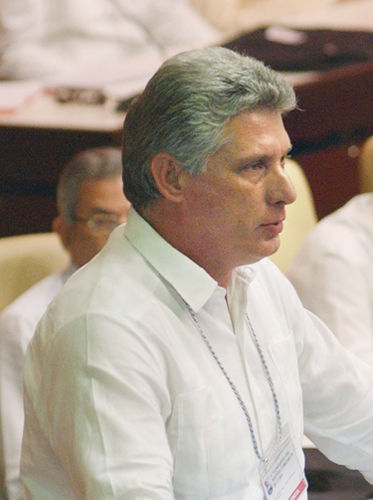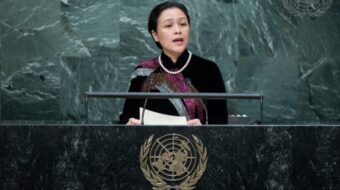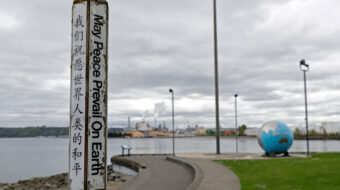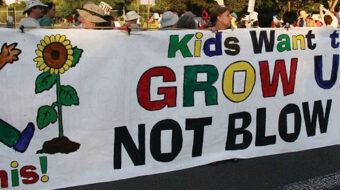
Heads of state gathered in Caracas March 5 for the “Chávez Forum: 21st Century leader of Latin American and Caribbean Unity.” They were honoring former Venezuelan President Hugo Chávez, who died on March 5, 2013. Miguel Díaz-Canel represented Cuba; as first vice president of Cuba’s Council of State, he is in line to succeed Raul Castro as Cuba’s president.
Speaking to the gathering, Díaz-Canel recalled that Chávez had “enabled millions of Venezuelans to escape extreme poverty and hunger, and gain health services, education, culture, jobs, and housing.” Díaz-Canel added that Chávez was “Cuba’s best friend.”
He spoke of problems facing Venezuela: “[R]evolutionaries are never alone, and the Cuban Revolution was not alone. Nor at this crucial time will it be that way for the Bolivarian Revolution.” The term refers to Venezuela’s process of social and political change led by President Chávez.
“Don’t worry about announcements of funerals,” Díaz-Canel advised; “already you’ve shown that while there’s one Chavista alive and fighting, the revolution will be standing firm. And you are millions!”
The mood is dark in part because voting on December 6, 2015 led to the United Socialist Party of Venezuela, the political party founded by Chávez in 2007, losing majority control of Venezuela’s National Assembly. Nicolas Maduro, Chávez’ successor as president, took office in April 2013 after a slim electoral victory. By contrast, the Bolivarian Revolution earlier had won one decisive electoral victory after another.
Díaz-Canel brought up other bad news: “The President of the United States [has] decided to extend for one more year the unjustified, disproportionate, and dangerous Executive Order that declares a ‘national emergency’ [regarding Venezuela.]”
President Obama on March 3 renewed the state of national emergency he declared one year earlier. Explaining his action to Congress, he mentioned “erosion of human rights and guarantees [in Venezuela], persecution of political opponents, curtailment of press freedoms, use of violence, human rights violations and … significant government corruption.”
The National Emergencies Act of 1976 provides for presidential use of such declarations for initiating U. S. economic sanctions against objectionable countries.
U. S. intervention is not new. The United States supported the failed anti-Chávez coup in 2002 and since then has funneled millions of dollars to hundreds of Venezuelan opposition groups. Annually the Obama administration adds “a special fund of $5 million in [its] budget to support anti-government groups in Venezuela.” The National Endowment for Democracy “continues to fund anti-government groups in Venezuela with about $2 million annually.”
Venezuelan society now is vulnerable to outside manipulation because of economic turmoil manifested as shortages and inflation. Causes include falling oil prices and destabilization through currency manipulation and hoarding by business interests.
Additionally, Díaz-Canel’s call for solidarity with Venezuela closely followed an announcement by the right wing “Table for Democratic Unity” (MUD by its Spanish initials) of a “road map” for overthrowing the Maduro government. Until now the MUD coalition has performed as the Maduro government’s electoral opposition.
On March 1 spokesperson Jesús Torrealba told reporters that MUD will pressure the Maduro government to “resign,” agitate for passage of a constitutional amendment allowing presidential elections in 2016, and organize for a referendum vote on shortening Maduro’s presidential term.
Torrealba spoke of “activating all mechanisms for change” and promised nationwide street demonstrations beginning March 12. The government accused “MUD of being the agent for implementing Obama’s sanctions in Venezuela.”
Now regional alliances and governments are coming to Venezuela’s defense. The roll call includes ALBA (The Bolivarian Alliance for the Peoples of our America), UNASUR (Union of South American Nations), CELAC (Community of Latin American and Caribbean States), Nicaragua, and Ecuador.
Meanwhile Cuban leader Miguel Díaz-Canel offered Venezuela advice and encouragement. He did so presumably on the strength of Cubans being the first people in the region to break free of U. S. dominion and successfully resisting U. S. aggression later on.
“[F]rom our own experience,” he observed, “we know that success depends on four factors: unbounded faithfulness to ideas and a just cause – which in this case are those of Bolivar and Chávez – indestructible unity of all revolutionaries, everyone working together and tirelessly, and infinite faith in victory.”
And, “We don’t want wars. We don’t want blockades. We don’t want interference. We don’t want subversion. We don’t want sabotage. We don’t want models of egoistic accumulation of wealth imposed on us for the sake of a few. We want peace. We want social justice and equity. We want sustainable development. We want security and respect for our sovereignty and independence. We want to share what we have. We want happiness and prosperity for everyone. And we want full integration in Our America!”
In highlighting the tie between Cuba and Venezuela, Díaz-Canel seemed to be telling the U. S. government that that relationship must be respected in order for the project of normalizing U.S. – Cuban relations to advance.
Photo: Miguel Díaz-Canel. Juventud Rebelde, April 27, 2013, public domain.












Comments